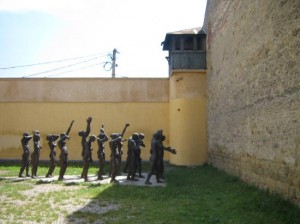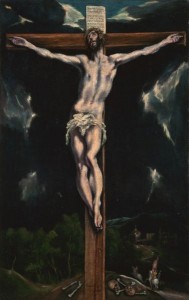Poetry in Translation (CXLVIII): Sergiu MANDINESCU (1926-1964), ROMANIA, Poet of the Communist prisons: “Amen – (Prison Prayer)”, “ AMIN (Reeducare)”
Amen (Prison Prayer)
Sergiu Mandinescu (1926-1964)
If I only had an angel’s quill
and the dark ink of night
perhaps only then I might
gather from all my vagaries
to write my memories
telling why I’m bleeding, I will.
Plundered stars of the night.
At the window of Hope – irons tight.
At the door of Salvation – the lock.
Our pale face, asleep on the block.
As the hatred breaks out, all its dark flame will sweep
in a split second, the fire will wring
our mind, soul and wing,
our ashes piled high, in a heap.
When the terrible hammers will shatter the silence
to pieces, as great as the penance,
our broken-up souls will be reaching the sky,
as the martyrs will burn on the pyre, up high.
Such a terrible grief and the beatings of kind
caused so many inmates to have shattered their mind
as a great many more for eternity strive
from the ones who’ve been there, just the dead are alive.
Just like him and like you, I am only a bloke:
see, My Lord? I do walk and I talk
as a true living corpse my existence is bare
I am ready, My Lord, to be taken up there.
I embrace all the pain and the anguish I merit
as I wait to be called by the heralds of Heaven
in the name of the Father, the Son and the Holy Spirit,
Amen.
Piteşti Political Prison, December 1949
(Rendered in English, from the Romanian original,
by Constantin ROMAN, London,
© 2012, Copyright Constantin ROMAN)
AMIN (Reeducare) Sergiu Mandinescu
De-aş avea o pană de înger
Şi cerneală de bezne,
Poate că abia atunci mi-ar fi lesne
Să mă adun din toate risipirile,
Să-mi scriu amintirile
Şi să spun tuturor de ce sânger.
Era o noapte jefuită de stele…
La fereastra nădejdii – zăbrele,
La uşa salvării – lăcate,
Iar frunţile noastre palide înnoptaseră toate.
Când, deodată, din mijlocul nostru
Izbucni, ca o flacără neagră, ura.
Focul ei a topit într-o clipă
Gând, suflet, aripă –
Toate din tot – şi n-a mai rămas decât zgura.
Baroase cumplite zdrobiră tăcerea
În cioburi de răcnete mari cât durerea.
Ţăndări din sufletele noastre au ajuns până la cer.
Martirii ardeau pe ruguri de ger…
Atât de cumplite au fost suferinţele,
Atât de năprasnică urgia,
Încât în noaptea aceea unii şi-au pierdut minţile,
Alţii şi-au pierdut veşnicia.
Într-un târziu toate sufletele zăceau sfărâmate.
Ah, amintirea asta ca pe o roată mă frânge!
Pe jos erau risipiţi creiţarii de sânge,
Plata atâtor păcate.
Dintre cei care au trecut pe acolo, numai morţii trăiesc.
Iată, de pildă, eu – umblu, vorbesc,
Asemenea lui, aşijderea ţie,
Dar viaţa mea nu-i, nu-i, prietene, decât o moarte vie.
Ah, Doamne, iată-mă aici, la ceasul comorilor,
Îmbrăţişându-mi lespedea de patimi şi chin.
Aştept îngerul zorilor,
Aştept Învierea,
În numele Tatălui şi-al Fiului, şi-al Sfântului Duh, Amin!
(Închisoarea Piteşti, decembrie 1949)
BIOGRAPHICAL NOTE:
Sergiu MANDINESCU spent fourteen years in prison, out of a short life of only thirty eight years… For the benefit of both the younger generation, as well as that of the world at large, unacquainted with the Communist practice, it is important to stress, that the poet MEMORISED his poetry in prison, as he was deprived of pen and paper. To make things worse he was often sent to solitary confinement, for long periods of time. To paleate to such difficulties, the best the poet could do was to rely on a good memory, in spite of the abject dehumanizing regime, which was meted on him, for longer than a decade. In the rare circumstances when Sergiu shared a cell with other prisoners, he might recite to them his poems: this was difficult because of the ever watchful eye of the warders, as much as of the potential informers and denunciators amongst the inmates themselves. It is a real miracle, that such oral exercises had survived to be put into print several decades later.
Sergiu came out of prison a physical wreck, yet determined to put pen to paper and write the poems that he memorized, behind bars. This in itself was a miracle, and a living example to his stamina, especially that he passed away, shy of one year, after he was “freed”: no political prisoner was ever freed, per se, as they suffered restrictions, were constantly harassed and called for interrogation, their rare visitors being discouraged or intimidated by the constant surveillance of the Securitate.
Even nearly three decades, after Sergiu’s death, that is after the demise of Ceausescu, the neo/old Communists of the Romanian media contrived to restrict, or discourage the publication of former political prisoners, but this is another subject: indeed, in present-day Romania, even as recently as 2009, when The Times Obituary of Monica Lovinescu was relayed word by word by the Romanian media, (often in a questionable translation), the last paragraph containing an indictment, by Lovinescu of the parlous state of affairs regarding the lack of freedom of expression, was completely left out by ALL Romanian media!
http://www.romanianstudies.org/content/2009/04/romanian-destinies-in-the-times-of-london-obituary-monica-lovinescu/
CORRIGENDUM:
The reader will have noticed the difference between the English and the Romanian subtitles, respectively, that is between “A Prison Prayer” and “Reeducare”. The translator of the Romanian original poem thought a great deal about such inadequate choice, dictated by the thinking behind it. In English, as spoken in the United Kingdom, the nearest equivalent to a “Reeducare”, roughly translated as “re-education”, is a “School for children with special needs”. Please note that such social establishment is intended, by definition, only for youth and NOT for adults! More specifically the English schools for youth with “”special needs”, are geared for children coming from dysfunctional families.
By contrast, in the Communist speak, a so-called “re-education” was intended as a smoke screen for extermination, of the worst possible kind, that is a slow-death of permanent dehumanization, through unimaginable deprivations AND persistent physical and psychological coercion and humiliation, of the worst kind. Compared even to the conditions in the Soviet gulags, described by Alexander Solzhenetsyn, the Romanian communist practice beggars belief, as the pupils Romanians were always striving to outdo their Soviet masters (apud the prison warder Nikolsky, born Boris Grünberg (1915-1992). It is glaring of Romania’s so-called “post-communist” (post Ceausescu’s) regime’s double-standards, that Nikolski enjoyed for over seven decades the life of luxury reserved for top-echelons nomenklaturists.
Bearing in mind the aforesaid and especially being mindful that the subtitle had to be short rather than periphrastic, the English translation opted for the next best compromise, that is one to which the Anglo-Saxon (and International) reader will be best acquainted with, yet one which reflects the spirit of the poem. That is because the poet, whilst he endures in the hands of his tormentors, a bestial “re-education”, he steels his resolve through a Christian prayer. That is because, unlike most other survivors of the political prisons, elsewhere in the World, the Romanian political prisoners, turned to their Christian Orthodox beliefs, as a final atonement.
ROMANIAN COMMENT:
7. Este timpul ca poezia lui Sergiu Mandinescu să poată fi apreciată, critic, în interiorul literaturii române contemporane. Atîta cîtă a putut lăsa posterităţii, în acei ani (1945-1964) un poet tînăr, militant, care-şi dedica creaţia valorilor morale perene, „iubirii, păcii, jertfei, mîntuirii” şi convins de „virtuţile nemuririi”. Un poet cum puţini au fost…
Supunem aici spre judecată critică poemele lui Sergiu Mandinescu. Ne putem întreba ce ar fi putut deveni un asemenea talent, mai tîrziu, dacă Destinul nu i-ar fi curmat viaţa la 38 de ani. Un poet tînăr nu rămîne totdeauna tînăr –, dar un erou trăieşte dincolo de timp.
În versurile lui Sergiu Mandinescu se disting, atît cît putem înţelege, registre poetice variate, bineînţeles, concordante cu epoca în care a trăit. Se pot recunoaşte, uneori, tonalităţi poetice simboliste, de la Dimitrie Anghel (Simfonia culorilor) pînă la Macedonski, Minulescu şi Bacovia. Regăsim, în Amin, verbul vituperant al lui Tudor Aghezi. Altfel spus, poezia lui Sergiu Mandinescu este o sinteza literara şi o confirmare poetică a suferinţei naţionale româneşti sub comunism. Acest Icar fără prihană care se avînta spre eroice idealuri greu de atins, aruncîndu-se în gol, s-a prăbuşit, aşa cum era de aşteptat, la pămînt. În pămîntul patriei.
Acesta a fost poetul Sergiu Mandinescu, care îşi caută astăzi locul pe care îl merită – în literatură, în istorie…
Alexandru Niculescu




No Comments so far ↓
Like gas stations in rural Texas after 10 pm, comments are closed.